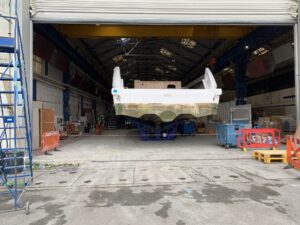Firms fined over £600k after dad dies from fall
A further two companies have been fined after a dad died following a fall from the roof of a building site in Warrington.
Father-of-one Dennis Vincent, 36, and another worker were using ropes to install a lightning protection system to the front of an office block being converted into flats.
Mr Vincent, who was from Stoke-on-Trent, Staffordshire, was lowering the access equipment from the roof, using a rope attached to a frame at roof level and a handrail at ground level. As he did so, both he and the frame fell from the roof to the ground.
The incident happened on 24 February 2021 at Palmyra House, Palmyra Square in Warrington.
Inco Contracts Limited and Prestige Security Installations Limited were fined on Thursday after a Health and Safety Executive (HSE) investigation.
The companies were found guilty of breaching health and safety regulations following a three-week trial at Liverpool Crown Court earlier this year. In February, PTSG Electrical Services Limited, Mr Vincent’s employer, was fined £120,000 after the company failed to adequately assess the risks associated with the working at height.
The HSE investigation found that Inco Contracts Limited, the principal contractor for the project, and Prestige Security Installations Limited, the contractor in control of the electrical installation package, failed to ensure that the lightning protection work was properly planned and failed in their duties to manage and monitor the work to ensure it was carried out safely. Due consideration had not been given to safer methods of working at height, such as the use of scaffolding or a mobile elevating work platform (MEWP), and the workers had been given no instruction or safe means of getting their equipment down from the roof.
HSE guidance can be found at: Work at height – HSE
Inco Contracts Limited, of Dunston Business Village, Stafford Road, Dunston, Stafford, Staffordshire, was found guilty of breaching Regulation 13(1) of the Construction (Design and Management) Regulations 2015. The company was fined £600,000 and ordered to pay £58,448 in costs at Liverpool Crown Court on 30 November 2023.
Prestige Security Installations Limited, of Sycamore Lane, Great Sankey, Warrington, was found guilty of breaching Regulation 15(2) of the Construction (Design and Management) Regulations 2015. The company was fined £30,000 and ordered to pay £15,000 in costs at Liverpool Crown Court on 30 November 2023.
HSE inspector Sara Andrews said: “It is vitally important that work at height is properly planned; where it isn’t, the risks can lead to the most serious of consequences. As such, duties are placed on all those involved in construction work to ensure that the risks are properly assessed and suitable control measures are implemented.
“Principal contractors and contractors should be aware that appointing subcontractors with specific specialisms does not remove the duty that they have to ensure the work has been properly planned and can be undertaken safely.
“Had Inco Contracts Limited and Prestige Security Installations Limited properly reviewed PTSG Electrical Services Limited’s proposals for carrying out the work, they could have ensured suitable controls were in place prior to work starting and this tragic incident could have been avoided.
“Our thoughts remain with the family of Dennis Vincent, a husband and father, who did not return home on 24 February 2021 because of the significant failings of these three companies.”
Notes to editors
- The Health and Safety Executive (HSE) is Britain’s national regulator for workplace health and safety. We prevent work-related death, injury and ill health through regulatory actions that range from influencing behaviours across whole industry sectors through to targeted interventions on individual businesses. These activities are supported by globally recognised scientific expertise.
- More information about the legislation referred to in this case is available.
- Further details on the latest HSE news releases is available.

